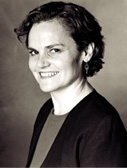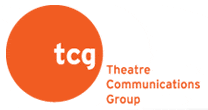Theatrical Types from All Over Invade Minnesota! The TCG Conference
Jaime Kleiman reports back from the national conference of the Theater Communications Group, held this year in Minneapolis, and chaired by Teresa Eyring, formerly of the Childrens Theater Company here in town.


The annual Theatre Communications National Group Conference invaded the Guthrie Theater last weekend, with approximately 850 artistic, executive, and marketing directors as well as theater producers in attendance. Based in New York City, TCG is an umbrella organization that publishes playscripts, theatre reference books, American Theatre magazine, and runs the ARTSEARCH employment bulletin Web site. In addition, it provides numerous artistic grants and fellowships in the categories of artistic leadership, management, and criticism.
The conference is held in a different city every year. Newly minted TCG Executive Director, Teresa Eyring—formerly of the Children’s Theatre Company—gave her welcome speech and introduced Guthrie artistic director Joe Dowling. Dowling gave the audience a not-terribly-concise history lesson about the Guthrie Theater. Other speakers included the Nobel Prize-winning poet, playwright, and activist Wole Soyinka, director Tina Landau, Rha Goddess (whose play, Low, closes at the Pillsbury House Theatre this Saturday), and Duncan Sheik, who wrote the music for the Broadway hit Spring Awakening.
The theme of the conference was “Artistry in a New Century.” According to the press release, the goal of the event was to turn attention “to creating theatre for today and tomorrow…. The conference will engage master artists and creative thinkers in the quest to craft theatre that resonates in our communities—locally, nationally, and globally.”
Preceding and following plenary speakers were dozens of artists’ workshops and breakout sessions, held at the Guthrie, Open Book, and the Mill City Museum. Local artists Faye Price and Noel Raymond of Pillsbury House, Megan Odell of Live Action Set, and Lou Bellamy of Penumbra Theatre, among many others, participated as panelists in breakout sessions and Salon Series discussions. Pulitzer Prize-winning playwright Suzan-Lori Parks, creator of the play-a-day project 365 Days/365 Plays, and Ellen McLaughlin were also in attendance.
Out-of-town attendees took advantage of their Saturday night to see shows and share a meal with local theatre professionals, after which they attended a reading of new plays at the Illusion Theater and an after-party. For younger participants, the conference was an opportunity to practice their schmoozing skills, see some old friends, and attempt to navigate the overwhelmingly large event and the opportunities buried somewhere within it.
Since the theme of the conference revolved around change, I was surprised to hear so many artistic and marketing directors bemoaning the Gen X-ers and Y-ers, who are all presumed to have no ability to sit still or comprehend long forms, and would rather watch The YouTubes on The Internets while checking The E-Mail than venture into a theatre. Apparently, theatre is dying because twenty-seven-year-olds would rather play on their Blackberrys than sit through a puffed-up production of Hamlet. (Personally, I’d opt for Wii bowling.)
Theatre isn’t dying but subscribers, many of whom are past retirement age, are. It’s time to get with it, people. The times they are a changin’ and Bob Dylan has gone electric. Or haven’t you heard?
While some people did mention Web integration, CDs, YouTube, free tickets, etc., the overall school of thought seemed to be that there’s nothing anyone can do to stop the terabyte madness. At the O’Neill Critics Conference last year, notorious critic John Simon said the same thing. The actors sitting with him, all of whom were over forty-five, nodded vigorously with pursed lips as he lamented the dumbing-down of America’s youth. Stupid people don’t want intelligent theatre! he said. They want to be entertained!
My advice, after hearing all this lamentation? Start making good theatre—with all due respect, Mr. Simon, good theatre is by definition also entertaining—and the hipsters, Web developers, and teenagers will figure out how to get there. Perform in non-traditional venues. Make coming to the theatre a communal event that bests virtual communities. Learn how to use technology to communicate with “the kids” instead of bitching about them. Support fledgling companies. Put up a MySpace page. Even if it seems stupid, I assure you, we’re not.